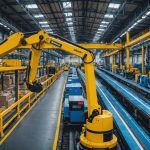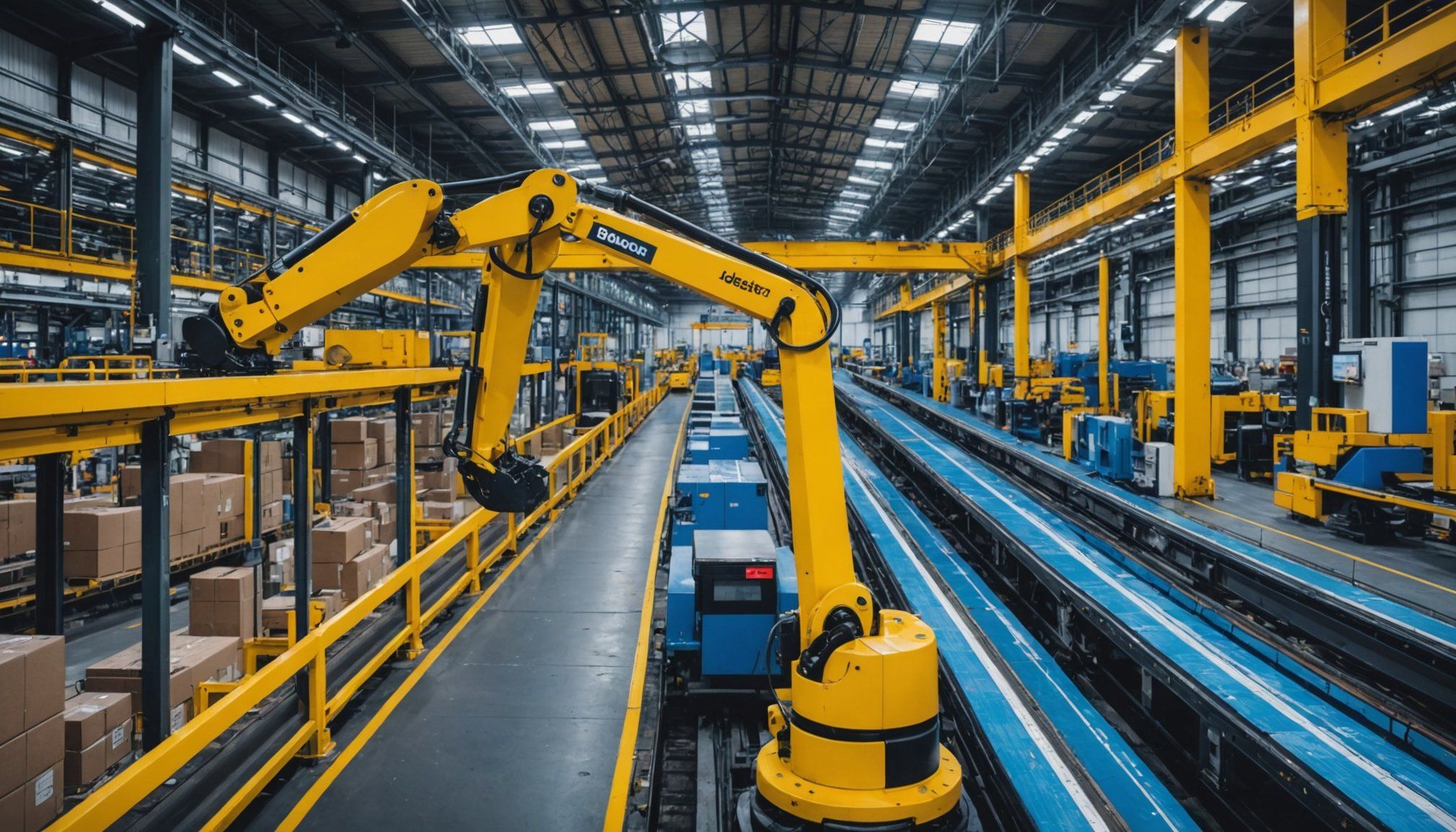Introduction to AI in Supply Chain Efficiency
In today’s fast-paced world, AI in supply chain management plays a critical role in enhancing the efficiency of logistics operations. The integration of artificial intelligence into supply chains has revolutionized how businesses operate, providing sophisticated solutions that enable better decision-making and streamlined processes. For UK businesses, supply chain efficiency is essential for maintaining competitiveness in the global market. Efficient supply chains reduce costs, improve customer satisfaction, and increase reliability.
Artificial intelligence contributes to supply chain efficiency through various innovative methods. These include predictive analytics, which forecasts demand and facilitates optimal inventory management, and machine learning algorithms, which anticipate disruptions and recommend actionable solutions. AI’s capabilities extend beyond mere process improvements, influencing industries as diverse as automotive and retail, by optimising routes, managing supplier relationships, and enhancing warehouse operations.
Additional reading : Revolutionizing customer service: innovative ai strategies for retail success in the uk
From predictive maintenance to adaptive algorithms, AI’s role in supply chain efficiency is undeniable. For UK logistics specifically, this means embracing technologies that drive productivity and ensure timely deliveries. As businesses continue to navigate the complex web of global trade, the importance of adopting AI in supply chain operations cannot be overstated. This empowers businesses to remain resilient, agile, and proactive in addressing future challenges.
Current Trends in AI and Supply Chain Management
In recent years, AI trends have shaped the landscape of supply chain management significantly. The integration of AI within supply chains is not merely a trendy innovation but a necessity for efficient and proactive operations. This is evident in the emergence of technologies such as machine learning and predictive analytics, which enable companies to forecast demand with remarkable accuracy. These technologies allow businesses to anticipate challenges and efficiently manage resources.
Also read : Driving product development: harnessing big data innovation in uk tech companies
In the UK, industry trends indicate a rapid adoption of AI technologies across supply chains. Recent statistics suggest that nearly 60% of UK-based businesses have integrated some form of AI into their operations. This widespread adoption showcases a shift towards a more intelligent and responsive supply chain model, driven by the need to optimize performance and reduce costs.
Industry-specific trends also underline how different sectors are leveraging AI to enhance their supply chain processes. For instance, the retail sector uses AI for inventory management by predicting stock levels based on consumer behaviour patterns. The manufacturing industry, meanwhile, implements AI-driven automation to streamline production and minimize human errors, demonstrating the industry-specific impact of AI on supply chains.
Case Studies of AI Enhancements in UK Supply Chains
In recent years, AI case studies have illuminated the transformative potential of artificial intelligence in various sectors of the UK supply chain. These success stories offer concrete examples of how technology can drive significant improvements.
Retail Sector
A notable example in the retail domain is a major UK retailer that integrated AI into its operations. This resulted in enhanced inventory management and improved customer service. The system used predictive analytics to anticipate stock demands, reducing both surplus and shortages. Measurable outcomes included an approximately 30% reduction in stockouts and enhanced customer satisfaction ratings due to more reliable product availability.
Manufacturing Sector
In the manufacturing arena, a UK manufacturer leveraged AI-driven analytics to boost production efficiency and minimize waste. By adopting these technologies, the company optimized its resource use and reduced waste by around 20%. The long-term benefits included consistent production quality and cost savings, propelling the firm to a competitive advantage.
Transportation and Logistics
One logistics company adopted AI for route optimization and saw remarkable improvements in delivery times and cost efficiency. By analysing real-time traffic data, the solutions reduced fuel consumption by 15% and enhanced delivery punctuality. Key lessons indicated the importance of continuous system updates and staff training.
Benefits of AI in Supply Chain Performance
Artificial Intelligence (AI) is revolutionising supply chain performance by significantly increasing operational efficiency. The integration of AI systems into logistics ensures key productivity enhancements. This is achieved through predictive analytics, which assists in anticipating demand accurately and adjusting supply levels accordingly. AI’s learning capabilities enable a reduction in inventory costs by optimising storage levels and reducing wasted resources.
Moreover, AI facilitates cost reduction opportunities in supply chain operations. One prominent method is through the automation of routine tasks, which minimises human error and accelerates processes. Automation also allows companies to deploy human resources in more strategic roles, enhancing productivity and operational efficiency. Additionally, AI tools provide insights for efficient route planning, lowering fuel consumption and transport costs.
AI’s role in improved decision-making cannot be overstated. By analysing large volumes of data, AI models enhance forecasting accuracy, making it possible to anticipate market trends and consumer demands better. This data-driven decision-making process empowers companies to remain competitive, adjusting their operations proactively rather than reactively. With precise forecasts, businesses can streamline supply chain performance, achieving a balance between service levels and cost management.
In conclusion, embracing AI in supply chain performance introduces substantial benefits in operational efficiency and cost reduction while enhancing overall decision-making capabilities.
Challenges and Considerations for AI Implementation
Implementing AI in UK businesses presents numerous challenges that need to be addressed carefully. One of the primary AI challenges involves data quality. Accurate and consistent data is crucial for AI systems to function effectively. Poor data quality can lead to flawed insights and decisions, ultimately undermining the technology’s value.
Another significant hurdle is the integration of AI with existing systems. Businesses often face implementation obstacles when attempting to mesh new AI technologies with legacy systems. This can result in compatibility issues and require significant IT resources for successful integration.
Additionally, UK businesses must consider supply chain risks associated with AI adoption. Over-reliance on AI systems in supply chain management can lead to vulnerabilities, as disruptions in AI services could severely affect operations. It’s vital to assess these risks and develop contingency plans to mitigate any adverse effects.
To combat potential resistance to AI adoption within organisations, clear communication and employee training are essential. By addressing concerns and illustrating the benefits of AI, companies can foster openness to technological change. Building a culture that embraces innovation is key to successful AI implementation. Encouraging collaboration between IT departments and other teams can further smooth the transition.
Actionable Strategies for Enhancing Supply Chain Performance
Taking a proactive approach to supply chain optimization can bolster operational effectiveness and efficiency. When considering AI adoption within the supply chain, there are several key strategies to keep in mind.
Evaluate and Identify Needs
Firstly, assess current supply chain processes to spot inefficiencies. This evaluation will help identify areas where artificial intelligence can have a tangible impact. Realistic expectations for AI adoption are crucial. By forecasting the potential benefits against achievable outcomes, a balanced perspective is maintained.
Invest in Training and Resources
Training your workforce in AI technologies is crucial for AI adoption. Understanding AI’s capabilities enables more informed, strategic decisions. There are resources available in the UK to support businesses aiming to educate their teams. Instilling a culture focused on continuous improvement ensures that your supply chain remains adaptive and responsive to market changes.
Measure and Analyze Outcomes
Set up performance metrics right after implementing AI to gauge success. Understanding which tools and methodologies are effective for monitoring will ensure that accurate tracking of supply chain efficiency occurs. By closely examining performance data, businesses can adapt their strategies swiftly, maintaining an edge in the competitive landscape.











